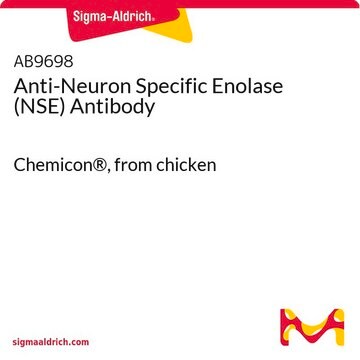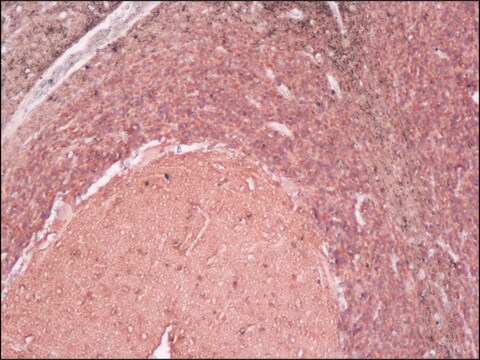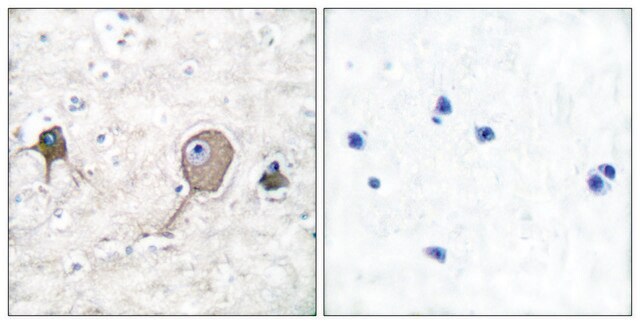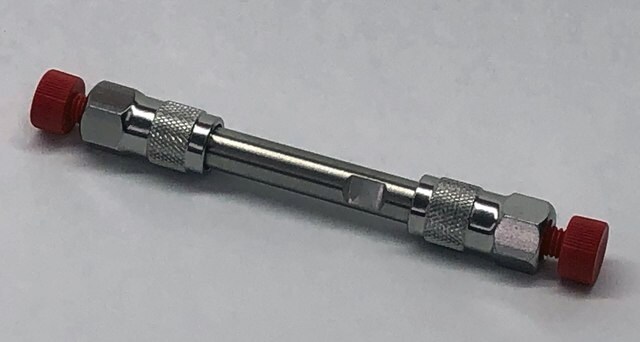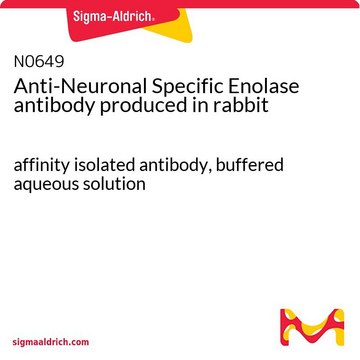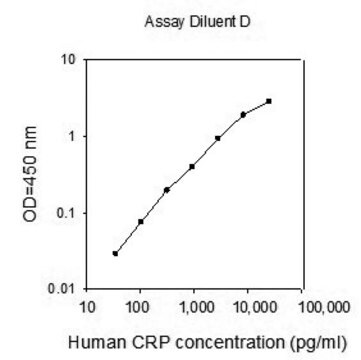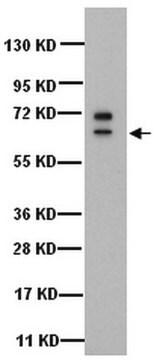MAB324
Anti-Neuron Specific Enolase Antibody, clone 5E2
clone 5E2, Chemicon®, from mouse
Synonim(y):
NSE
Zaloguj sięWyświetlanie cen organizacyjnych i kontraktowych
About This Item
Kod UNSPSC:
12352203
eCl@ss:
32160702
NACRES:
NA.41
Polecane produkty
pochodzenie biologiczne
mouse
Poziom jakości
forma przeciwciała
purified immunoglobulin
klon
5E2, monoclonal
reaktywność gatunkowa
human
producent / nazwa handlowa
Chemicon®
metody
ELISA: suitable
immunocytochemistry: suitable
immunohistochemistry: suitable (paraffin)
western blot: suitable
izotyp
IgG2a
numer dostępu NCBI
numer dostępu UniProt
Warunki transportu
wet ice
docelowa modyfikacja potranslacyjna
unmodified
Specyficzność
Human gamma neuron specific enolase. Recognizes a 45kD band corresponding to gamma NSE on immunoblots of human brain extracts.
Immunogen
Neuron-specific enolase from human brain.
Zastosowanie
Anti-Neuron Specific Enolase Antibody, clone 5E2 detects level of Neuron Specific Enolase & has been published & validated for use in ELISA, WB, IC, IH(P).
Immunoblotting
ELISA
Immunohistochemistry. May be used on formalin-fixed, paraffin embedded sections.
Optimal working dilutions must be determined by end user.
ELISA
Immunohistochemistry. May be used on formalin-fixed, paraffin embedded sections.
Optimal working dilutions must be determined by end user.
Research Category
Neuroscience
Neuroscience
Research Sub Category
Neuronal & Glial Markers
Neuronal & Glial Markers
Powiązanie
Replaces: CBL220
Postać fizyczna
Format: Purified
Liquid in PBS pH 7.4 containing 0.1% sodium azide.
Przechowywanie i stabilność
Maintain at 2-8 °C for up to 12 months under sterile conditions.
Inne uwagi
Concentration: Please refer to the Certificate of Analysis for the lot-specific concentration.
Informacje prawne
CHEMICON is a registered trademark of Merck KGaA, Darmstadt, Germany
Oświadczenie o zrzeczeniu się odpowiedzialności
Unless otherwise stated in our catalog or other company documentation accompanying the product(s), our products are intended for research use only and are not to be used for any other purpose, which includes but is not limited to, unauthorized commercial uses, in vitro diagnostic uses, ex vivo or in vivo therapeutic uses or any type of consumption or application to humans or animals.
Ta strona może zawierać tekst przetłumaczony maszynowo.
Kod klasy składowania
10 - Combustible liquids
Klasa zagrożenia wodnego (WGK)
WGK 2
Temperatura zapłonu (°F)
Not applicable
Temperatura zapłonu (°C)
Not applicable
Certyfikaty analizy (CoA)
Poszukaj Certyfikaty analizy (CoA), wpisując numer partii/serii produktów. Numery serii i partii można znaleźć na etykiecie produktu po słowach „seria” lub „partia”.
Masz już ten produkt?
Dokumenty związane z niedawno zakupionymi produktami zostały zamieszczone w Bibliotece dokumentów.
Manipulation of human pluripotent embryonal carcinoma stem cells and the development of neural subtypes.
Rebecca Stewart, Victoria Buyers Christie, Stefan Alexander Przyborski, Rebecca Stewart et al.
Stem Cells null
The neural adhesion molecule TAG-1 modulates responses of sensory axons to diffusible guidance signals.
Law, CO; Kirby, RJ; Aghamohammadzadeh, S; Furley, AJ
Development null
Maja Mustapic et al.
Frontiers in neuroscience, 11, 278-278 (2017-06-08)
Our team has been a pioneer in harvesting extracellular vesicles (EVs) enriched for neuronal origin from peripheral blood and using them as a biomarker discovery platform for neurological disorders. This methodology has demonstrated excellent diagnostic and predictive performance for Alzheimer's
Benedito A Carneiro et al.
Clinical cancer research : an official journal of the American Association for Cancer Research, 24(12), 2732-2739 (2018-03-22)
Purpose: Small cell carcinoma of the prostate (SCCP) is an aggressive disease that can arise de novo or by transdifferentiation from prostate adenocarcinoma. Alterations in anaplastic lymphoma kinase (ALK) gene are involved in neuroblastoma, lung cancer, and other malignancies, but
Formation of neurospheres from human embryonal carcinoma stem cells.
Grace M Horrocks, Lyndsey Lauder, Rebecca Stewart, Stefan Przyborski
Biochemical and biophysical research communications null
Nasz zespół naukowców ma doświadczenie we wszystkich obszarach badań, w tym w naukach przyrodniczych, materiałoznawstwie, syntezie chemicznej, chromatografii, analityce i wielu innych dziedzinach.
Skontaktuj się z zespołem ds. pomocy technicznej